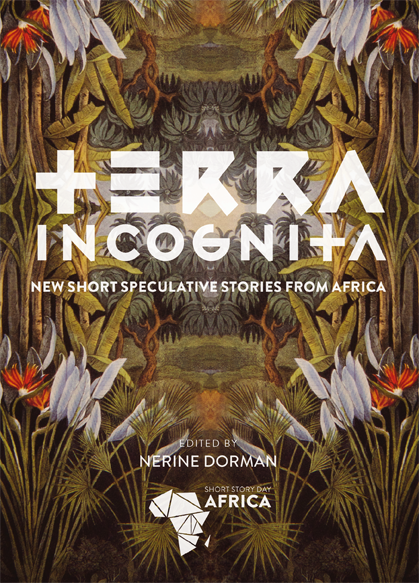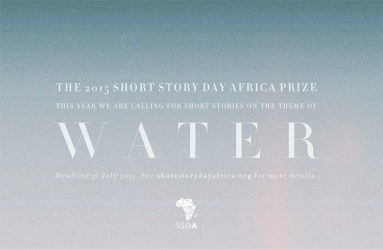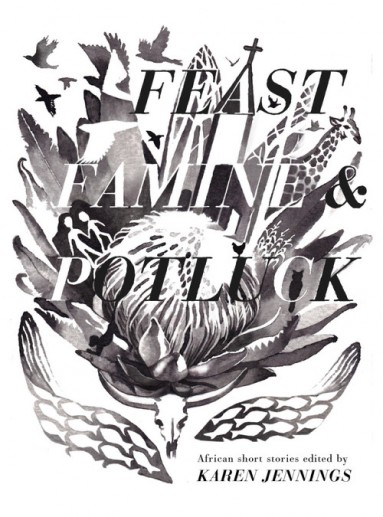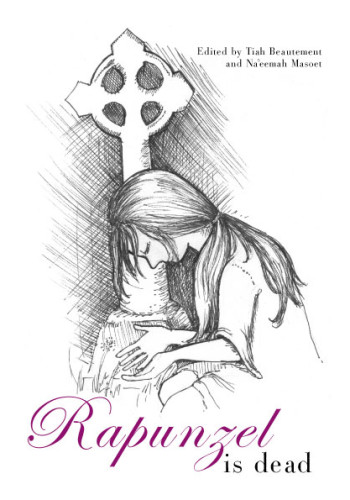Short Story Day Africa is a wonderful initiative that was started by the South African novelist Rachel Zadok -- author of Gem Squash, Tokoloshe and Sister-Sister -- and in the three years of their existence, they've already managed to do excellent things. In the last two years, they've put out two of the best anthologies of new fiction I've read in some time (Feast, Famine & Potluck and Terra Incognita: New Short Speculative Stories from Africa) as well as a lovely looking anthology of young fiction by young people, Rapunzel is Dead, that I just purchased for $0.99 (and so can you). They're fundraising for their third anthology Water -- you can donate here -- and I anticipate it will be amazing. Did I mention that you can donate here? You can donate here.
I had a chance to meet Rachel a month ago in Kampala, and interviewed her over email yesterday. A very lightly edited transcript is below.
AB: As you told Bwesigye in March, Short Story Day Africa (SSDA) began with a focus on Southern Africa, "but then decided to expand because writers from the north wanted in." Could you talk about how that happened?
RZ: We'd always intended the project to develop organically, though how we thought that would happen turned out to be very different to the end result. I guess we didn't expect the response to the project that it got. I think, when it started, writers on the continent were looking for somewhere to publish their work, work that didn't necessarily have appeal to a Western publishing industry that pretty much wanted to tell the same stories the media was telling about Africa. Social media was just a couple of years old and it was either get published in the West, or you were pretty much voiceless. In the first year, we just published an extended circle of writers we knew and writers they knew on a website I'd thrown together. We were email based then. The second year we were inundated with requests from writers to send us their stories, and we started the Facebook page. By the third year, writers beyond Southern Africa were asking to be included, so we changed the name, made a new Facebook page and opened it up to any African writer.
The issue then was that the concept of celebrating the short story on the shortest day of the year no longer made any sense, because countries from the above the equator were participating, but we were kind of stuck with that. 21 June still remains the official day to SSDA celebrates short stories, but it always throws a bit of a conundrum at the team because it's not really what we do anymore. What we do is: publish startling voices telling nuanced stories about Africa and assist them in developing their work. We profile writers and run mini-workshops online. We're a support platform for African writers and publications featuring African writers.
I guess I mainly just know SSDA from the anthologies! Could you tell me more about the ways you function as a support platform outside of the work you publish?
We run a feature every Wednesday under the hashtag #WriterWednesday in which we interview an African writer and publish the interview on our website blog. Then, throughout the day, we publish links to their work, website etc etc on our social media sites. So basically, our social media for the entire day, from the morning read to the final quote is by that writer.
We link back to the work other online journals are doing via our social media sites, so that they and the writers they publish get more attention. We also publish all their calls for submissions etc, on our social media sites.
On Facebook we run an event every two weeks called #WriterPrompt. It's for writers to hone their skills and get writing advice. We provide a prompt and they write 200 word flash fiction stories. Everyone who writes is encouraged to comment on the other stories, and the writers edit and work on their skills as one would in any creative writing workshop. Tiah Beautement, a member of our team, runs the events and provides professional support - she's a published writer but also has a lot of experience running workshops. It works as a mini-workshop, but also a way for writers to showcase their work. At the end of the event, we select one of the stories and run the story and an interview with the writer as the #WriterWednesday feature. It's a way for emerging/unpublished writers to get a moment in the limelight.
Why do you feel like the South African literary scene has been so insulated from the rest of the continent? And is that changing?
There's been a whole lot of upheaval in the SA literary scene of late, under headings 'decolonising literature' and #litapartheid, which refers to the white dominated publishing industry in South Africa. The weird thing is that, if you speak to South African writers on both sides of the race divide, both feel the other side has the better deal. White South African writers feel they stand very little chance of publication here or abroad, and that publishing houses favour black writers. Black writers feel that their work is of anthropological interest to white audiences, and that the structures of literary festivals and publishing houses capitalize on that.
Both are right to some extent, but I think the real issues are more complex. The readerships for local fiction are pitiful (read Tom Eaton's scathing but very astute article about publishing in SA for more about that), books are incredibly expensive and everyone is looking at the wrong place to sell their work, i.e. the USA and Europe. No one is looking to the rest of Africa for markets. At least in the offices of the publishing houses, there seems to be this belief that beyond South Africa is a dark continent of illiterate hut dwellers. I asked my publisher to send my last novel to other publishers in other African countries, like Cassava Republic for example, but was told it was pointless, that there was no market.
It's a total fallacy. But no one here is talking about the vibrant and growing publishing industry on the continent. It's like shouting into a gale force wind of dissent if you bring it up. I did during a panel at the Franschhoek Literary Festival earlier this year and had people up in arms.
Why were people up in arms?
I'm not really sure why it hit such a nerve. I basically said that writers in South Africa needed to look to Africa as an alternative market, and not keep trying to publish in markets that had little interest in the stories we had to tell, unless they fit into a certain paradigm, and that writers moving off the continent ended up writing about the experience of being African in the diaspora, and that we were limiting the African story by only looking to the west for publication. One publisher said that if Africans were really interested in reading our novels they could buy them off Amazon, and another woman wanted to know why I thought the immigrant experience wasn't a valid one, which I hadn't actually said. I don't think writers here are ready to admit that they're not going to find an audience in Europe and the USA necessarily.
Why did you decide that the second anthology would be a speculative fiction anthology?
A very practical reason. All the submissions for the first anthology, Feast, Famine & Potluck, were literary fiction. When I asked why no genre writers had submitted work, they said they viewed SSDA as a project for literary writers. We didn't want that. So we sent out a call for speculative fiction (including every genre under that umbrella, and literary fiction) and placed it the theme of exploring unchartered territory, Terra Incognita.
Since you write speculative fiction, I'd love to hear your thoughts on what seems to me to be a real boom in African writers writing in this category, these days.
I actually write what is considered by publishers to be literary fiction with speculative elements, and by other speculative fiction writers to be spec fic. I don't know why there needs to be these categories. I find it confusing, unhelpful and divisive to label work in terms that either isolates the readers or makes writers feel insecure about their work. I choose to read work that appeals to me stylistically and has a subject matter I'm interested in. I don't care if it's spec fic, historical fiction or literary fiction. Besides which, all fiction is speculative.
I think it would be easy to box the appeal of spec fic for African writers, but I doubt the answer of why is so simple. Maybe and it's because it lends itself to being able to discuss issues without the risk of landing up in hot water? Maybe, for some writers, it fits the story they're working on? Maybe it's just one of those things that becomes popular via osmosis? I think we have to be careful of looking at African spec fic and trying to pin some sort of anthropological reason onto its existence.
What does SSDA bring to the literary landscape that wouldn't otherwise be there?
An openness to all kinds of stories that you wouldn't traditionally find in one anthology. We have a reading process that choses readers from a wide range of cultures, and every story is read by three readers who score it. A story that appeals to a reader in Uganda and Botswana sometimes scores low with a reader in South Africa, for example. In a way, the stories are curated by an African readership rather than a single entity. Those stories are then edited by two editors who work closely with the writers over three months to develop the story but also the skills of writer without every imposing voice. It's intense and it can be trying, but it's a beautiful thing.
I love the fact that you don’t simply select short stories, but that you work to develop the stories you’ve accepted. [say more about that process? Perhaps a good example/anecdote?]
It's difficult to give an anecdote without naming the story, but I'll try. One story scored two 10s (10 out of 10 - yes, it's like ice-skating our scoring system) from a reader in Botswana and a reader in Nigeria., and 2 from the South African reader. I read the story and found it challenging – honestly I just couldn't see what they had loved so much to score two perfect 10s – but because it has scored so highly from two of the readers who come from a different narrative sensibility - perhaps a traditional way of telling stories that is lacking my personal history – we went ahead and included it. We then realised that the story needed to be read out loud to be truly appreciated. It's a beautiful piece of prose poetry that I've come to appreciate, but when I first saw it I didn't get it. If it had been just me curating the anthology, that voice would not have been heard.
Why have you focused specifically on the short story? I ask partly because of the strange way the Caine prize (AKA the "African Booker") is a prize for short stories, and because it seems like that’s where so much of the action is, these days.
Honestly, there are only three of us in the SSDA team!
Jokes aside, I don't know why the 'African Booker' focused on the short story. A lot of people feel the reason was an insulting one, but I also think perhaps the short story in Africa is like the short story in the USA. People love them. We love to write them and we love to read them. In the UK, short stories are not popular, nor do they sell very well in South Africa. I think the literary scene is just a vibrant and growing one where many forms of literature are appreciated still. Also, people are publishing on the internet quite a lot now, and that lends itself better to short stories than novels.
How is SSDA funded? The anthologies are gorgeous and very high quality. But I'm assuming that sales don't cover the operating costs?
Well thank you. We do make an effort. Funds come from a variety of sources. Worldreader gives us seed funding every year and that covers the cost of the editing. But he majority comes from crowdfunding. We pre-sell the anthologies before we've even selected the stories, and we sell sponsorships.
We've been very lucky because the project was designed around the idea of community, as in an African writing and reading community both on the continent and beyond, and people have responded to that. There's a sense of ownership, that it belongs to the community. So people give in kind as well as cash. Last year Fox & Raven, a small indie publisher, e-formatted the books for us. This year, Electric Book Works is formatting the ebooks.
We still need to raise money to pay the team and the writers, as well as our admin costs, hence the crowdfunding. If you go to the donate page on our website, all the ways people can fund us are listed. http://shortstorydayafrica.org/donate/



